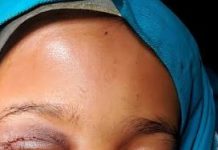Phone addiction a significant health risk: Dr. Tayyab Afghani
ISLAMABAD, MAY 14 /DNA/ – The leading ophthalmologist at Al-Shifa Trust, Prof. Dr. Tayyab Afghani, said on Tuesday that smartphones have developed into a significant risk for youngsters.
Mobile phones keep children connected at all times and serve many positive purposes, but overuse has become common, leading to serious eye complications, he said.
Talking to media men, Dr. Tayyab Afghani said smartphones can have severe and long-lasting effects on children’s eye health.
He said parents and teachers should know about the consequences of children staring at smartphones for too long.
According to him, most children with access to a smartphone use it almost all the time, while those whose eyesight is still developing have disastrous impacts on their vision.
Afghani said smartphones can potentially contribute to epidemic levels of eye problems, and a research shows that by 2050, the vision of 50 percent of the world’s population may be affected.
He said mobile phones have anti-glare screens and settings that reduce the emission of blue light, which may damage the cornea. However, adjusting the brightness, contrast, and size of the text can reduce some harm to the eyes.
Teaching children to blink frequently when watching the screen and ensuring the screen is at least 16 inches away from their eyes while watching is always helpful.
He stressed that parents and teachers should try to involve children in other activities that distract them from the screen.
He said that setting time limits on how long kids can stare at screens is the best way to keep them from getting eye problems.
Every six months, a trained ophthalmologist should examine children’s eyes, lubricant eye drops should be used, and the 20-20 rule must be followed.
According to this rule, a person using a screen should shift his eyes to look at an object 20 feet away for at least 20 seconds. This should be repeated after a 20-minute gap.

















